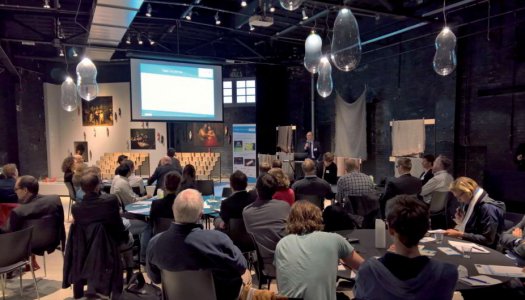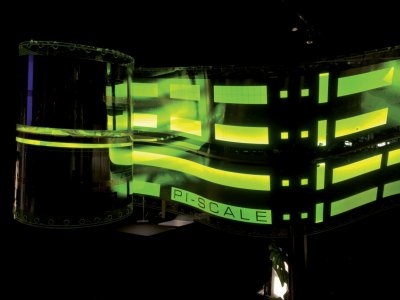Pi-Scale is a scientific project initiated in Europe as an interface for planners and different lines of business with the goal of advancing the further development of photonics technologies such as OLEDs, and to accelerate the path the products need to take from scientific research to mass production and from there into the professional market. In order to meet these theoretical goals, which are funded by the European Union, in the practical sense the Pi-Scale team came up with the idea of staging an "OLED Lighting Workshop" in Eindhoven/NL.
While the streets of the Dutch town were filling with people who had turned out to view the light art installations at this year’s Glow Festival, developers, designers and potential users gathered at the invitation of Pi-Scale in a dedicated work space in the centre of Eindhoven to learn more about OLEDs and the status quo of the technology and to consider how this technology might be applied in practice in the future.
How does OLED technology work? What are its special features and what distinguishes it from other lighting systems or solutions? What is already possible today and what can be further developed to meet future requirements? How are OLEDs currently being applied? And how are they produced? These were the kind of questions the event embarked on answering at the start of the meeting. The speakers included a couple of experts from the altogether 14 research and industry partners from five European countries – a group hosted by the Holst Centre, an independent R&D centre based in Eindhoven. The informative part at the start of the workshop was followed by a practical interactive session. The attendees were divided into six round table groups and asked to focus on specific areas of application such as medicine, architecture or automobile industry. The task was to exchange ideas in an open, creative manner and come up with application concepts that would use OLED technology effectively and in the ideal case, and in accordance with the Pi-Scale perspective, discover ways of using the product lines available to build on series production opportunities. Some of the ideas which were ultimately presented did come across as being feasible, while others would have definitely required continuous further development of the technology and production processes.
The first so-called "hands-on" OLED Lighting Workshop concluded with a B2B Forum to discuss OLED technology today and in the future, and business opportunities with key players in the industry. Besides providing more basic information about the technology, the sessions invited designers to pitch their visions for OLEDs in the future and how and why the technology should continue to be an option.
Outside, the people’s attention was focussed on the Eindhoven light festival; inside the workshop participants focussed on expanding their know-how on/around OLEDs and the potential they offer, but also including the somewhat awkward situation this technology finds itself in. This first Pi-Scale workshop was built around basic data, prepared and presented in different ways, plus the input provided by those attending the event, who comprised professionals from a variety of backgrounds who were willing to brainstorm on the topic of application potential. The goal was clear: to ensure that in future, OLED material will leave the comfort of the experimental laboratories and be put into meaningful production more speedily. That also means that more effort needs to be made to make this technology and its qualities known, while developers, designers and end-users in the industry need to commit to searching for new applications.

